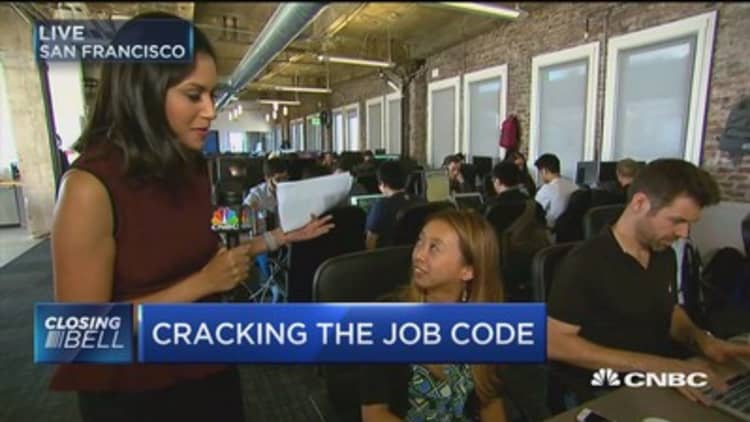
Tucked away on the top of two floors of a downtown building in San Francisco, 160 students are sitting in front of computer screens, developing sophisticated web applications.
Their school, Hack Reactor, is one of dozens of coding boot camps across the nation, turning students into software engineers. For many prospective students looking for a quick route to a six-figure salary at a big tech firm, coding camps have become attractive alternatives to colleges and grad schools.
Muhsin Abdul-Musawwir chose Hack Reactor over finishing his computer science degree at California State University, East Bay.
"The Hack Reactor program was going to get me the skills that would translate directly into getting a job," said Musawwir. "The computer-science route, while it may be something I may still explore later on, wasn't necessarily what I felt was going to ... get me the job, get me working, get me the skills I need to work and also build up my own practice."
Hack Reactor costs nearly $20,000 for a 12-week session, about one-tenth of the cost of attending an elite college. The program boasts a 98 percent job placement rate among its graduates, who land jobs at prestigious tech companies such as Google, Facebook, Amazon and Microsoft. The average starting salary for graduates is $105,000 a year.
Hack Reactor co-founder Shawn Drost says coding boot camps help address the shortage of software engineers, especially in tech-saturated areas like Silicon Valley. The company also has schools in Los Angeles, New York and Austin.
Drost says unlike colleges, coding camps can quickly change curriculum to address the changing needs of the marketplace.
"Professional programs do change every six months or so, and we adopt that pretty much immediately," said Drost. "So we are teaching up-to-date versions of recent open-source framework, and we are familiar with industry trends in a way that you don't generally see in college programs."
Students spend 12 to 16 hours a day in classes, listening to lectures, coding and collaborating in teams that simulate ones in tech firms. They also receive "empathy training," which instructors say is a vital part of the program because the soft skills help them work well with others, which is important in the workplace.
While critics argue a coding camp can't replicate a four-year education that colleges provide, Drost says by immersing students in a coding environment, they learn more quickly.
"I think people underestimate how much you can learn in a short time frame," said Drost. "You can really compare and contrast the difference between different modes of learning. If you've ever taken a language class in high school and college versus actually going to that country and immersing yourself, it's incredible."
Still, some raise concerns. Google recently conducted a study on coding camps. "We found that boot camps show increasing promise in preparing their participants for full-time software development and engineering roles, and we've hired a handful of these students. However, our experience has found that most graduates from these programs are not quite prepared for software engineering roles at Google without additional training or previous programming roles in the industry," said the company's director of education and university relations, Maggie Johnson, in a statement.
The White House is also paying attention to coding boot camps. Some students are now allowed to apply for federal grants and loans to help pay for certain coding schools, like the Flatiron School in New York, or MakerSquare in Austin, TX. President Obama has called coding boot camps "a ticket to the middle class."
Musawwir agrees. The former coordinator of after-school programs is now a software engineer at Esurance. Since going through coding camp, Musawwir has doubled his salary.


